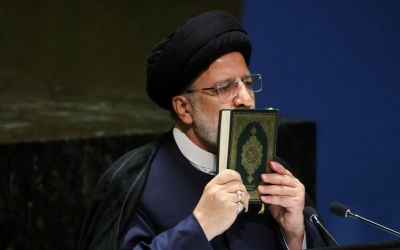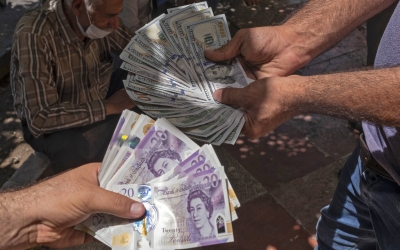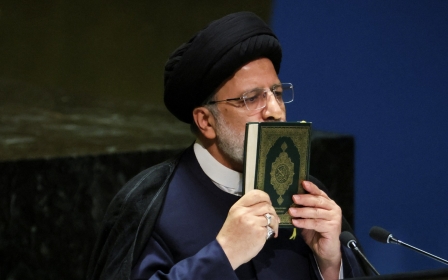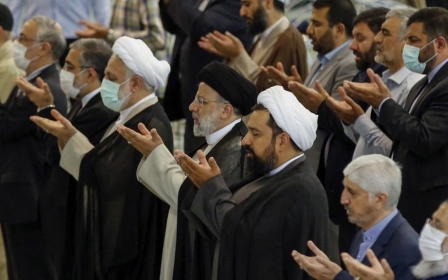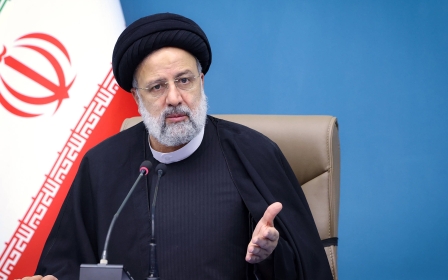Iran: The pivotal election that will decide who succeeds Ali Khamenei
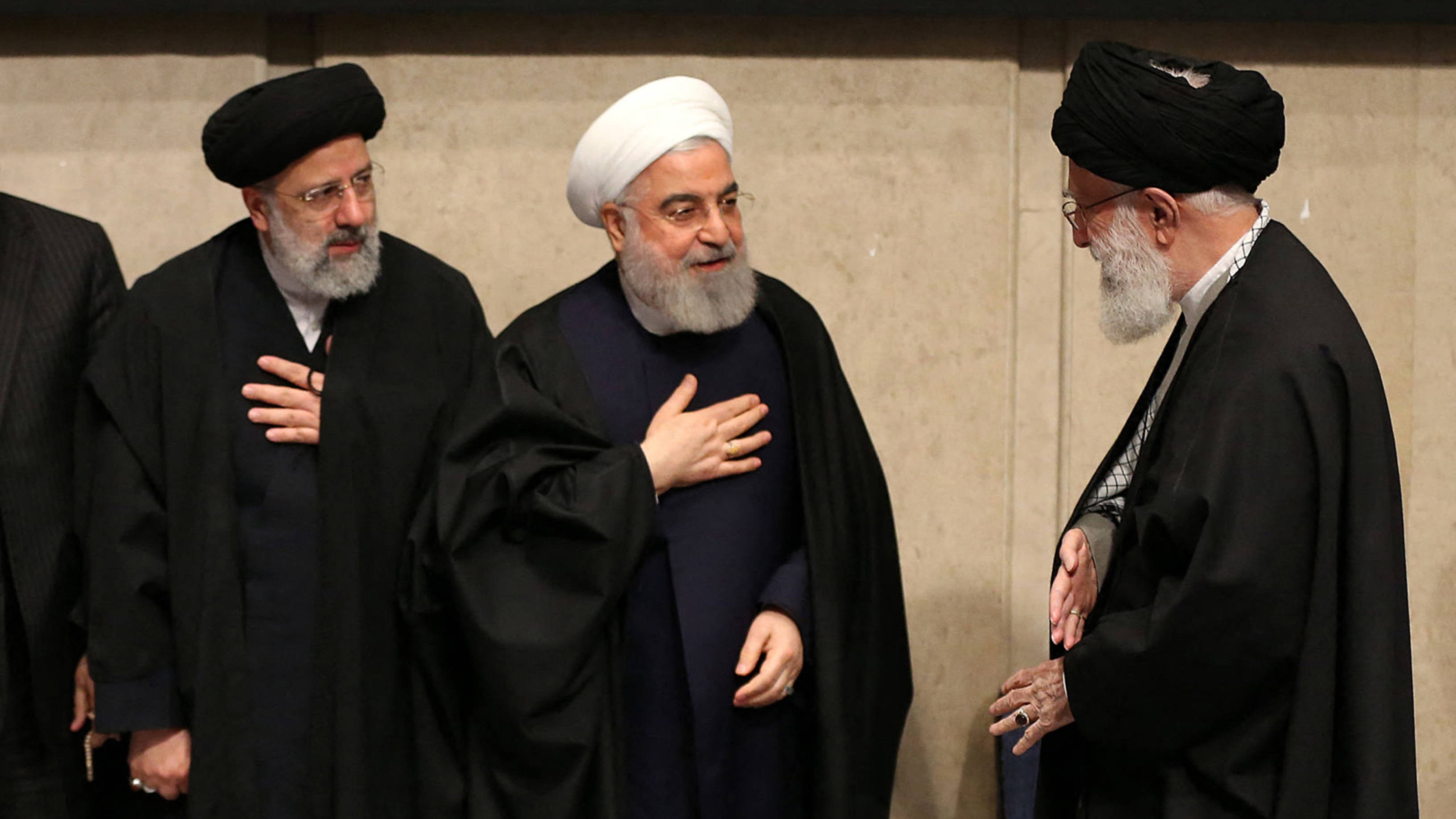
Behind closed doors, discussions have been taking place about the most important decision Iran will take for years to come.
Key to this decision is the upcoming election of the Assembly of Experts, the body that will decide who will replace Supreme Leader Ayatollah Ali Khamenei, 84, as the most powerful political and religious authority in the Islamic Republic.
“The race for replacing Khamenei has already begun and is very heated, and whatever you've seen in Iran in the past two years, and onward, must be analysed in the context of the struggle and fight over the chair of Khamenei," a former conservative official told Middle East Eye on condition on anonymity.
This assembly is composed of 88 qualified Islamic jurists and clerics who, based on the constitution, are responsible for appointing, supervising, and dismissing the supreme leader. All candidates must possess high-level clerical knowledge to be eligible to run for the race.
According to media reports, 510 people have registered their names for the election, which takes place every eight years and will next be held on 1 March 2024. Around 52 percent of the candidates participated in the previous Assembly of Experts election, and the rest are running for the first time.
New MEE newsletter: Jerusalem Dispatch
Sign up to get the latest insights and analysis on Israel-Palestine, alongside Turkey Unpacked and other MEE newsletters
In 2014, Khamenei warned Iranian authorities about "influences in the decision-making centres" of the Islamic Republic, and said of his opponents: "They are waiting for the nation and the political system to fall asleep, and in 10 years, when I am not alive, for example, they would achieve their goals."
Khamenei's sensitivity and his attempt to keep the assembly within his own circles have led the Guardian Council, tasked with vetting the candidates, to disqualify a large number of hopefuls, including prominent ones.
Notably, the members of the Guardian Council are themselves directly and indirectly chosen by the leader.
For instance, Hassan Khomeini, the grandson of the Islamic Republic's founder Ayatollah Ruhollah Khomeini, was barred from the race in 2016.
Hassan Khomeini, a moderate senior cleric with close ties to reformists, has long supported reformist candidates in different elections.
A source in the reformist camp told Middle East Eye on condition of anonymity that former two-time president Akbar Hashemi Rafsanjani, who was also a member of the Assembly of Experts, had planned to bring up Khomeini and pave his way for the race to replace Khamenei in case of his death.
However, the council rejected Khomeini and foiled Rafsanjani's plans.
Rouhani vs Raisi
Among the candidates running in the race are former reformist president, Hassan Rouhani, and current principlist President Ebrahim Raisi, both seeking a third term on the assembly.
However, unlike Rouhani who is running in Tehran, it is unclear if Raisi will too run in the capital, where he has low popularity.
According to the former conservative official, who spoke to MEE on condition of anonymity, conservative circles and those close to Raisi have suggested that the president keep his constituency of Birjand, in South Khorasan province, worrying about his chances of winning if he runs in Tehran instead, and the number of votes he would receive in comparison to Rouhani.
With the current 97-year-old chairman of the assembly, Ahmad Jannati, not running in the race, some names stand out as likely contenders, including Raisi; Tehran's Friday prayer leader Ahmad Khatami; the senior seminary official Ahmad Araafi; and the Qom Friday prayer leader Hashem Hosseini Bushehri.
As for Rouhani, it is not clear whether he will be allowed to run in the election this time.
Will Rouhani be allowed to run?
A reformist official in Rouhani's government said the former president was rejected and barred from the presidential race in 2017 by the Guardian Council, but was later approved to run after a series of consultations. Rouhani went on to win the election and served for a second term.
The official believes that for that reason Rouhani would likely be rejected and disqualified to run again for a seat on the assembly.
"However, I personally think that if Rouhani hadn’t received the green light from a senior official, he wouldn’t risk the likely disqualification," he told MEE on condition of anonymity.
Meanwhile, Mohammad Mohajeri, a moderate conservative political activist, told local media: "It is predictable that Mr Rouhani would be disqualified because the attacks against him have started.
"A few nights ago, I attended a mosque in Mahalati neighbourhood [which is frequented by Revolutionary Guard commanders] and a well-known fundamentalist preacher in that mosque called Mr Rouhani the worst, declared that he does not have enough clerical knowledge, and clearly said that Rouhani is a British spy.
"I think the disqualification of Mr Rouhani is more than likely."
Crossing red lines
A few days after announcing his candidacy, Rouhani noted that the assembly's new term may be more important than the current one.
"We ask God for a long life and more success for the supreme leader, but as time passes, the possibility grows of that rainy day when members of the assembly must enter the phase of the [leadership] election debate," he said.
'Whatever you've seen in Iran in the past two years, and onward, must be analysed in the context of the fight over the chair of Khamenei'
- former conservative official
"I thought a lot about whether to register or not. I thought that if I assume that I would be influential among the members, I will be held acc0untable [in the afterlife] if I do not register. I registered based on this assumption.
"I also consulted with my friends, and a certain number believed that I should register."
It is very rare for senior officials and politicians to speak about the death of Khamenei, even considering his advanced age.
Unsurprisingly, Rouhani's speech was met with harsh criticism from principlists who, on social networks, wished for his death before Khamenei's.
"It is important for the reformists and moderates to have a strong person like Rouhani in the assembly to at least be aware of what is going on there," the former conservative official told MEE.
"When the time comes, many of those principlist clerics in there may change their minds based on the situation and conditions; therefore, Rouhani’s presence would be important as it could affect their votes."
Who will be the next leader?
Ayatollah Mohsen Araki, a member of the Assembly of Experts, recently said that it is almost impossible for the assembly to elect a non-Iranian as the leader.
His comments are notable as there have always been rumours and whispers in political circles about a likely election of a non-Iranian, probably the head of the Lebanese group Hezbollah Hassan Nasrallah, as the leader.
A more realistic choice however would be the son of Khamenei himself, Mojtaba Khamenei, who has been very active in behind-the-scene politics in Iran and has always been mentioned as the likely final candidate.
Simultaneously, many in the West believe Raisi to be a probable successor to Khamenei, although some in Iran seemingly believe the president does not have much chance.
The former conservative official told MEE that it is very unlikely that Raisi would be among the candidates for the leadership as "he is weak and a pawn of other senior officials in Khamenei’s office".
No one is aware of the final candidates for Iran's highest post, not even themselves, except Khamenei.
There is a commission in the assembly tasked with studying and finding suitable persons to replace the supreme leader.
This article is available in French on Middle East Eye French edition.
Middle East Eye delivers independent and unrivalled coverage and analysis of the Middle East, North Africa and beyond. To learn more about republishing this content and the associated fees, please fill out this form. More about MEE can be found here.


